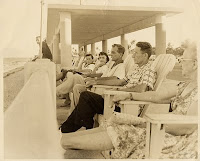Discovering your personal brand ... and why it matters
We've talked previously about the importance of your personal brand. Identifying your brand can be a powerful self-discovery exercise. It's your core, it's what's special about you, it's what you contribute. I would argue that you discover your brand - rather than contrive it through framing or wordsmithing.
Your brand needs to be concrete and compact, easily digestible, easily remembered. "Stick-able." Think about a job interview: what would be the 1, 2, 3 things you'd want to convey?
- Successful team builder and turnaround expert
- Retail operations shrinkage guru
- NYT bestselling author
- 23-time Gold Medal Olympic athlete
- Skilled relationship manager in emotionally charged settings
In business we talk about your Unique Value Proposition. Your personal brand (nor your UVP) is not everything about you; it's not everything you're good at. There is power in condensation: a brand must stick. If your personal brand rambles, you run the risk of a potential employer, client, or donor remembering your least-impactful skilllsets. We have limited engagement opportunities, and it's key that we make the most of them.
Your brand is special and unique, therefore you need to know your competition - you need to be grounded in reality. And, complementarily, your language should be selected for your audience, not your colleagues (unless they're your audience). Let me share some examples from my own service in senior living. Which statement in each pair has more impact?
- We provide great care!
OR
- We are the only Assisted Living community in town who employs licensed nurses 24 hours every day.
- We offer three meals daily and snacks, and our food is great.
OR
- Our dining room is open from 7 am to 7 pm, and our chefs make all dishes from scratch, supplementing with ingredients from our organic garden.
- We have a vibrant activities program.
OR
- Our diverse activities schedule runs from 9 am to 6 pm daily.
Boiled down, your goal is meaningful specificity, tailored for your audience and illustrating what is unique and special.
Now, I'm writing this article as much for myself as for you. Sometimes I feel I've conveyed my personal brand succinctly; whereas other times, I've missed the opportunity to share my brand as a foundation or framework for my audience. And in those situations, I find I must take steps backward throughout our conversations, sharing foundational points in drips and drabs. Ineffectively.
Here are some helpful prompts in discovering your personal brand:
- What skills come easily to you?
- Who is your audience - client, interviewer, donor, team? Know them specifically.
- Who is your competition? What do they do well, and what is the expected standard?
- List out all of your key skillsets or positive qualities. Use general language.
- Then, highlight the most impactful for both you and your audience. Cross out the ones without power.
- Continue narrowing until you have your top 3 or so skillsets or qualities.
- Lastly, think of a specific example which illustrates each.
Practice speaking your personal brand. It may feel a bit forced at first, but if you've gotten to your essence with specificity, I think you'll find it empowering.
Now, Discover Your Strengths



THIS is a great article, and timely for me. I know I struggle with brevity, and this is a terrific reminder. Merci, Brenda! (P.S. I always love your shoes!)
ReplyDelete